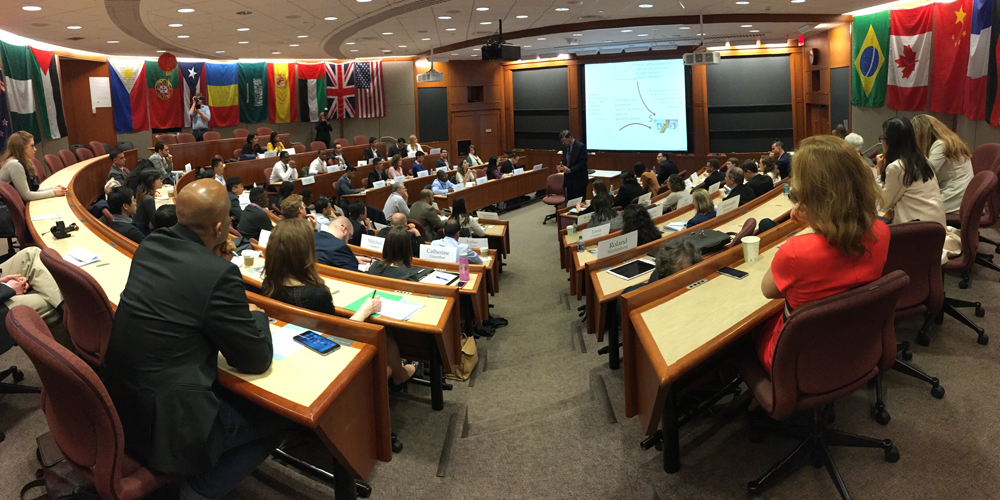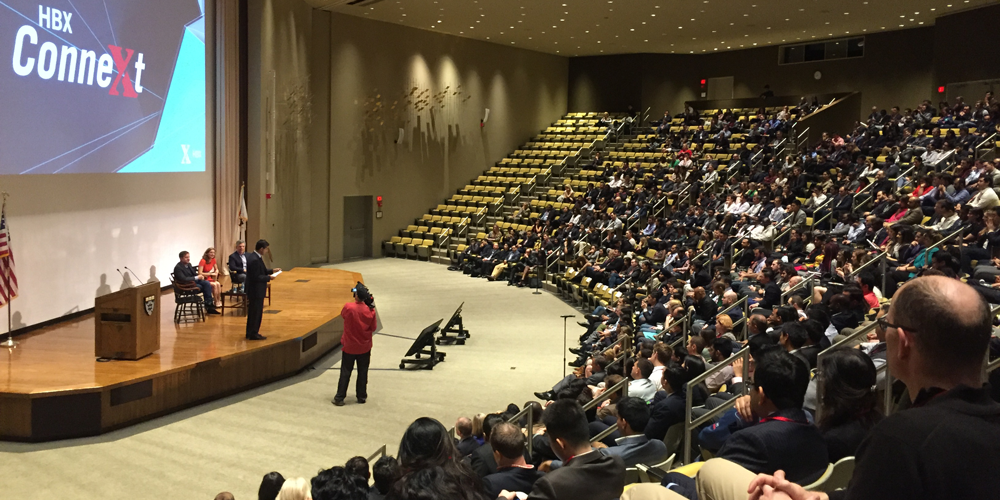
When I think of a traditional residential college, I picture ivy-covered brick buildings, stately Greco-Roman facades, and checkered-floor libraries filled floor-to-ceiling with books. Essentially, I picture Harvard’s stately campus.
When I signed up for HBX CORe, Harvard Business School’s online-only cohort focused on business fundamentals, I didn’t think much about community. After all, it was “just something I was taking online.”
I couldn’t have been more wrong. Hundreds of HBX past participants gathered at Harvard Business School this past Saturday for HBX ConneXt to celebrate exactly that. After engaging in spirited online debates, e-meeting people from Bangalore to Baltimore, and messaging directly with my fellow cohort, I was able to put faces to names, hear their stories, and make real, in-person connections with people I had interacted with for months.
Between student panels, a campus tour, and faculty sessions throughout the day, I felt inspired—and ready—to take on the mission of HBS: making a difference in the world.
Here are a few of the moments that inspired me the most from HBX ConneXt:
“With [online education], the constraint is only the motivation and talent of individuals looking to better themselves.”
--Professor Bharat Anand
Professor Bharat Anand opened the day by discussing the transformational power of education. He explained that traditional education is a privilege because of scarcity, and that scarcity comes only from the literal, physical constraints of a college campus. With online, that’s completely changed.
If you’re motivated to make yourself better and to learn, you’re able to more than ever. He reminded us that it’s ok to never have done something before. HBX ConneXt was “the first time we’ve had a gathering of students we’ve taught…but never met.”

“Trying to understand the customer is the wrong unit of analysis. You need to understand the job that needs to be done.”
--Professor Clay Christensen
As a marketer, I constantly focus on customer demographics: who are they, what they care about, and their daily habits. Professor Christensen flipped this on its head during his faculty session and spoke of instead the job that needs to be done. What problem does your product solve?
Rather than focusing on differentiating by product, differentiate by solution. Ultimately, our characteristics don’t cause us to buy something—the flow of daily life does.
“As much as I love math and analysis, the hard stuff is what we traditionally call the ‘soft stuff’: managing people.”
--Professor Jan Hammond
HBX CORe provides a common language of business: how to understand your finances, analyze trends and performance, and bring your product to market. But the next step for all of us is the soft skills.
Professor Hammond emphasized learning how to lead an organization in skills like analytics, but also in mindset. She also encouraged us to push ourselves and each other to be the bestwe can be, and to gather people around us who will always ask why.

“Be substantive, not superficial. It’s real results that matter.”
--Larry Culp, Senior Lecturer of Business Administration at HBS and former CEO of Danaher Corporation
As a former CEO, Larry’s advice gave great insight into what real business leaders care about day-to-day. He focused on education as an important self-investment and the sense that people are more important than numbers. Encouraging us to take the long view on issues and on our careers, he talked about maintaining a “continuous improvement” mindset.
We can no longer pretend that doing things as we’ve always done them will be successful. By building a culture where you can say, “I don’t know—but I’ll go find out,” and positioning problems as opportunities, not failures, makes a difference in the success of your company, but also of your career.
“Management is doing things right. Leadership is doing the right things.”
--Anne Dwane, Partner & Co-Founder, GSV Acceleration
For the closing panel, Anne emphasized the opportunity education provides us to become more knowledgeable, but also to become better people. She encouraged us to “create more value than you take,” and to continually give back to our communities.
Today’s workforce is changing, and traditional ways to select for talent aren’t working. We all need to remember that it’s not just about doing everything correctly, but about seeking a path forward—particularly as we start to co-work more frequently with machines.
The real value of HBX was the ability to learn and meet new people completely different from me. I met a fellow from Singapore raving about his first-ever lobster roll, a native New Yorker visiting Boston for the first time, and an intelligence officer from D.C who couldn’t really talk about what he did every day.
Alumni traveled from as far as Australia and as close as Allston, from all walks of life, work experiences, and backgrounds. Together in one room, you could really see how much we had to learn from one another.
As Professor Anand told us in closing, “The story of HBX is still being written—and you will shape that narrative.”
The success of any training program isn’t what happens during it; it’s what happens after. I can’t think of a better way to celebrate the completion of the program—and the start of my “after.”
About the Author
Kayla Lewkowicz participated in the January 2016 cohort of HBX CORe. She is the marketing coordinator for a tech start-up in Cambridge, MA who took CORe to better understand her company. Her reflections on the program can be found on her blog.








